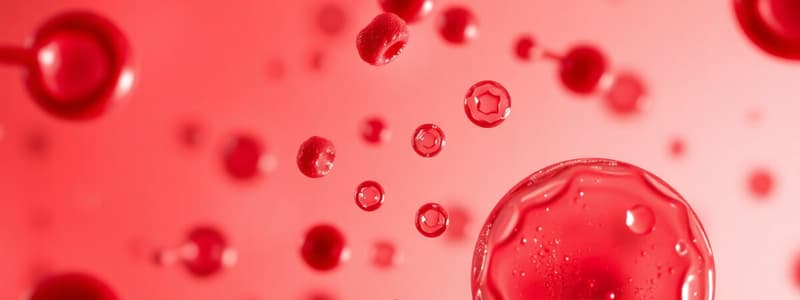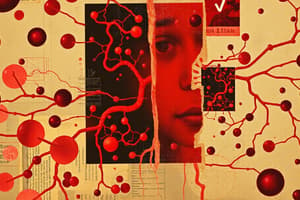Podcast
Questions and Answers
What is the primary function of blood plasma?
What is the primary function of blood plasma?
- To facilitate the movement of substances within the body (correct)
- To transport carbon dioxide away from tissues
- To fight against pathogens
- To produce red blood cells
Which component constitutes the majority of blood plasma?
Which component constitutes the majority of blood plasma?
- Coagulants
- Proteins
- Water (correct)
- Electrolytes
Which component of the blood is responsible for oxygen transport?
Which component of the blood is responsible for oxygen transport?
- Plasma
- White blood cells
- Platelets
- Red blood cells (correct)
What is the approximate composition of plasma in human blood?
What is the approximate composition of plasma in human blood?
What role do coagulants like fibrinogen play in blood plasma?
What role do coagulants like fibrinogen play in blood plasma?
Which of the following is NOT a component of blood plasma?
Which of the following is NOT a component of blood plasma?
What can happen if the blood proteins in plasma are too low?
What can happen if the blood proteins in plasma are too low?
What percentage of human blood is made up of white blood cells?
What percentage of human blood is made up of white blood cells?
What is the primary role of water in blood plasma?
What is the primary role of water in blood plasma?
Which component is responsible for the yellow color of blood plasma?
Which component is responsible for the yellow color of blood plasma?
What percentage of plasma is typically made up of water?
What percentage of plasma is typically made up of water?
What is the significance of Type AB+ plasma in donations?
What is the significance of Type AB+ plasma in donations?
Which function is NOT performed by blood plasma?
Which function is NOT performed by blood plasma?
How often can a person donate plasma, considering the replenishment time?
How often can a person donate plasma, considering the replenishment time?
What is the primary use of donated plasma?
What is the primary use of donated plasma?
Flashcards are hidden until you start studying
Study Notes
What is Blood Plasma?
- Blood plasma is the liquid component of blood remaining after removing blood cells (erythrocytes, leukocytes, and thrombocytes).
- Plasma is crucial for transporting substances, regulating pH, fighting infections, and assisting in blood clotting.
Components of Blood Plasma
- Water is the primary component of plasma, making up 91-92%.
- Other components include clotting factors (e.g., fibrinogen), proteins (albumin, globulin), electrolytes (potassium, sodium, bicarbonate, chloride, calcium), and immunoglobulins.
- The presence of bilirubin and carotenoids gives plasma its yellowish color.
Functions of Blood Plasma
- Plasma transports hormones, oxygen-carrying red blood cells, waste products, platelets, white blood cells, nutrients, and acts as a suspending medium for blood cells.
- Plasma helps maintain osmotic pressure and regulates blood pH (7.35-7.45).
Plasma in the Human Body
- Plasma is found inside blood vessels (veins and arteries), referred to as intravascularly.
- The blood-to-plasma ratio in healthy individuals is 1.02 (45% blood, 55% plasma).
- The average adult has around 0.6-0.8 gallons of plasma, but this can fluctuate due to dehydration or excessive water intake.
Importance of Plasma
- Donated plasma replenishes missing fluid, proteins, immunoglobulins, and bilirubin in patients.
- Plasma is used in transfusions for trauma and shock patients, treatment of liver disease, and clotting factor deficiencies.
- It is also used in clinical and laboratory research.
- Plasma replenishes in approximately 48 hours, allowing donations twice every 7 days with a day between donations.
Plasma Donation
- Plasma donation is opposite to blood type matching.
- Type O- blood is a universal donor for blood transfusions but a universal recipient for plasma donation.
- Type AB+ plasma, which lacks A or B antibodies, is a universal donor for plasma transfusions.
Studying That Suits You
Use AI to generate personalized quizzes and flashcards to suit your learning preferences.




